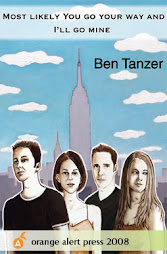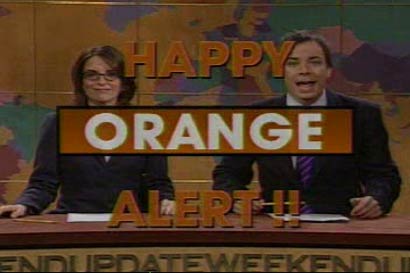
Patrick Somerville
Patrick Somerville is the author of last year's short story collection "Trouble", which has gained him some very positive press. His story "Friends From Cincinnati" was recently published by THE2ndHAND, and he has had several other stories published in recent years. Patrick currently teaches creative writing at the Graham School in downtown Chicago.
Recently, Patrick was able to take some time out to answer a few of our questions.
Orange Alert (OA): I know you are originally from Wisconsin, do you consider yourself a "Chicago" writer? What is your opinion of the current Chicago literary scene?
Patrick Somerville (PS): Oh, I don't know. Wherever I go I slowly start writing about my location, but it usually takes a few years for it to seep into my consciousness. When I was in New York I was writing about Wisconsin, when I was in San Francisco I was writing about New York, and now that I'm in Chicago I'm writing about Wisconsin again, plus a few Chicago stories here and there. Wisconsin will always seem like home to me--it has a gravitational pull in my imagination. Part of why I love Chicago is that it's sort of the urban incarnation of the Midwest. The people feel recognizable to me in ways they didn't on either coast. And by that I don't mean fat--that's just a coincidence.
People in Chicago care about literature a lot, but beyond that I don't have much opinion about the literary scene. I'm lucky in that I have some friends here who are writers. Sometimes we are in public places with other writers, and I have fun. But I have other friends, too. You're in a lot of trouble as a writer if you spend much time planning your life based on those things. What's important is the time you spend alone, working, writing, and struggling with the problems of your art. That doesn't happen at bars.
OA: Who are some of your biggest literary influences?
PS: John Cheever, Joseph Heller, Virginia Woolf, Charles Portis, Lorrie Moore. Secretly: Margaret Weis and Tracy Hickman. Recently: Paul Bowles, who is stranger and darker than any writer I can think of.
OA: What are your thoughts on book tours/readings? Do you feel differently about your pieces when you perform them at readings? Should fiction be performed?
PS: I think I've both improved and damaged stories during readings, depending on the situation, the audience, the particular piece. One of the best readings of my life happened in this dark, nearly-empty bar in New York maybe four years ago. The microphone was perfect and the audience was really generous with reacting to the story, and near the end I felt like a storyteller, not a fiction writer, you know? Like it was a performance, and it mattered that it happened live. But I've given bad readings, too. I've stumbled over words and read too fast and chosen the wrong thing. My grandmother talked through an entire reading I gave in Green Bay. I started shaking at a reading once and had to hold the story against my stomach. They can get weird.
OA: How did you come to teach inmates at Auburn State Correctional Facility? What was that experience like, and what did you take away from your time there?
PS: Cornell had and has a kind of patched-together prison program run by an insane man named Pete Wetherbee, who is now an Emeritus professor. Creative writing is usually popular in prisons, and I found Pete and told him I wanted to teach the class. A couple of other writers and I went every week for a year and ran a workshop with about 25 students.
I took away a lot, but I'm not sure I can articulate it. Prisons are dark, powerful places where imagination is massively important and constantly under fire. I think, in a way, it's a commodity. It's like a drug in and of itself--I can't tell you how many times someone submitted a short story or a poem that had to do with teleportation, or floating out through the walls of a cell, into the world. I had students with unbelievable talent and other students who could not form sentences, who were there because class constituted a kind of escape. One of our students got a three book deal to write hip-hop thrillers. That was the dream that many of them had. I think I became a better teacher in that I had to work to connect to students. 90% of them were black and poor, and I'm a rich white person from the suburbs. And yet fiction-writing and storytelling was more than enough of a bridge to bring us together into a kind of community. It was interesting, to say the least, to go up to Auburn on Wednesday nights to run the workshop and then go to class on Thursday mornings to see my Ivy League undergraduates. What was really great was that they were often having the same problems with shit like flashbacks.
It's beyond stupid that the federal government doesn't spend more money on education in the prison system. During class you could just feel new kinds of social experiences opening up for the students. If anyone is going to have a chance to start a new, different life when they get out of prison, it will be the people who have confidence and flexibility working with mainstream institutions, not to mention the people who can write. I look at that little Cost-of-Iraq-War-Widget on your sidebar and just cringe. $3000/second for that, nearly nothing here.
OA: Your first book, a collection of short stories entitled "Trouble" came out last fall, how are dealing with the critical success of this collection?
PS: I feel almost exactly the same as I did before the book came out--anxious about finding time to write and learning more. I'm proud of Trouble and I like all the stories, but I want it to be a starting place.
OA: What's next for Patrick Somerville?
PS: I've been working on a novel for the last two years, and I'm also getting pretty close to having a second collection of stories ready to go. We'll see what happens. The novel takes place in the woods, in northern Wisconsin, and is not very funny at all. There is a monster and it has wings. I know that sounds funny, but it's not.
For more information of Patrick Somerville please visit his website and also check out his blog.
+by+Nick+Volkert).jpg)





















1 comment:
this was good. i laughed.
patrick, read joy williams.
Post a Comment